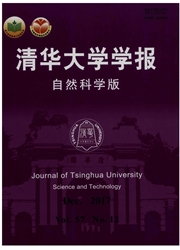

 中文摘要:
中文摘要:
基站协作是多小区正交频分多址接入(OFDMA)系统中降低共信道干扰的有效手段。为了降低收集各小区信息所需的开销,提出一种新的基站协作资源分配算法。算法由各基站计算本小区的业务负荷及所有子信道对本小区的价值,并发送至中心节点。根据这两类信息,资源首先由中心节点分配至各小区,再由各基站分配至用户。该算法的开销仅约为现有方法的2/U(U为协作小区的总用户数)。与无基站协作的方法相比,该算法仍可获得30%以上的用户容量或吞吐量增益。结果表明:本算法兼具实用性和有效性,有望应用于新一代移动通信系统。
 英文摘要:
英文摘要:
Base station cooperation is an efficient way to mitigate co-channel interference in muhicell orthogonal frequency division multiple access (OFDMA) systems. The overhead for information collection from each cell is reduced by a resource allocation algorithm with base station cooperation. In the algorithm, each base station computes the traffic load of its cell and the capacity of all subchannels to its cell, and sends them to the central node. This information is used to allocate resources first to each cell by the central node and then to users by each base station. The algorithm overhead is about 2/U (U is the number of the users in all the cooperative cells) that of existing methods. The algorithm achieves a user capacity gain or throughput gain of more than 30% compared with counterparts without base station cooperation. The results verify the practicality and efficiency of the algorithm for new generation mobile communication systems.
 同期刊论文项目
同期刊论文项目
 同项目期刊论文
同项目期刊论文
 Performance analysis for buffer-aided communication over block Rayleigh fading channels: queue lengt
Performance analysis for buffer-aided communication over block Rayleigh fading channels: queue lengt Improving the Energy Efficiency of Two-Tier Heterogeneous Cellular Networks through Partial Spectrum
Improving the Energy Efficiency of Two-Tier Heterogeneous Cellular Networks through Partial Spectrum Joint Mode Selection and Resource Allocation for Cellular Controlled Short-Range Communication in OF
Joint Mode Selection and Resource Allocation for Cellular Controlled Short-Range Communication in OF Performance Study of A Deep Space Communications System with Low-Density Parity-Check Coding under S
Performance Study of A Deep Space Communications System with Low-Density Parity-Check Coding under S Time-Frequency Training OFDM with High Spectral Efficiency and Reliable Performance in High Speed En
Time-Frequency Training OFDM with High Spectral Efficiency and Reliable Performance in High Speed En Generalised Spatial Modulation System with Multiple Active Transmit Antennas and Low Complexity Dete
Generalised Spatial Modulation System with Multiple Active Transmit Antennas and Low Complexity Dete Corrections to the Proof in `Coordinated Beamforming for the Multicell Multi-Antenna Wireless System
Corrections to the Proof in `Coordinated Beamforming for the Multicell Multi-Antenna Wireless System Interference-Aware Relay Selection Scheme for Two-Hop Relay Networks With Multiple Source-Destinatio
Interference-Aware Relay Selection Scheme for Two-Hop Relay Networks With Multiple Source-Destinatio Distributed Power Allocation for Coordinated Multipoint Transmissions in Distributed Antenna Systems
Distributed Power Allocation for Coordinated Multipoint Transmissions in Distributed Antenna Systems Analysis of Boundedness and Convergence of Online Gradient Method for Two-Layer Feedforward Neural N
Analysis of Boundedness and Convergence of Online Gradient Method for Two-Layer Feedforward Neural N Distributed Multichannel and Mobility Aware Cluster-based MAC Protocol for Vehicular Ad-hoc Networks
Distributed Multichannel and Mobility Aware Cluster-based MAC Protocol for Vehicular Ad-hoc Networks Optimal Combination of Base Station Densities for Energy-Efficient Two-Tier Heterogeneous Cellular N
Optimal Combination of Base Station Densities for Energy-Efficient Two-Tier Heterogeneous Cellular N Active interference cancellation-aided QoS-aware distributed ARQ for cognitive radios with heterogen
Active interference cancellation-aided QoS-aware distributed ARQ for cognitive radios with heterogen Weighted sum-rate maximization for multi-user SIMO multiple access channels in cognitive radio netwo
Weighted sum-rate maximization for multi-user SIMO multiple access channels in cognitive radio netwo Traffic-Aware Base Station Sleeping Control and Power Matching for Energy-Delay Tradeoffs in Green C
Traffic-Aware Base Station Sleeping Control and Power Matching for Energy-Delay Tradeoffs in Green C Throughput Improvement by Joint Relay Selection and Link Scheduling in Relay-Assisted Cellular Netwo
Throughput Improvement by Joint Relay Selection and Link Scheduling in Relay-Assisted Cellular Netwo Next-Generation Digital Television Terrestrial Broadcasting Systems: Key Technologies and Research T
Next-Generation Digital Television Terrestrial Broadcasting Systems: Key Technologies and Research T Simplified Direct Search Method for Constrained Nonlinear Mixed-Integer Programming of Two-Dwell Ser
Simplified Direct Search Method for Constrained Nonlinear Mixed-Integer Programming of Two-Dwell Ser 期刊信息
期刊信息
